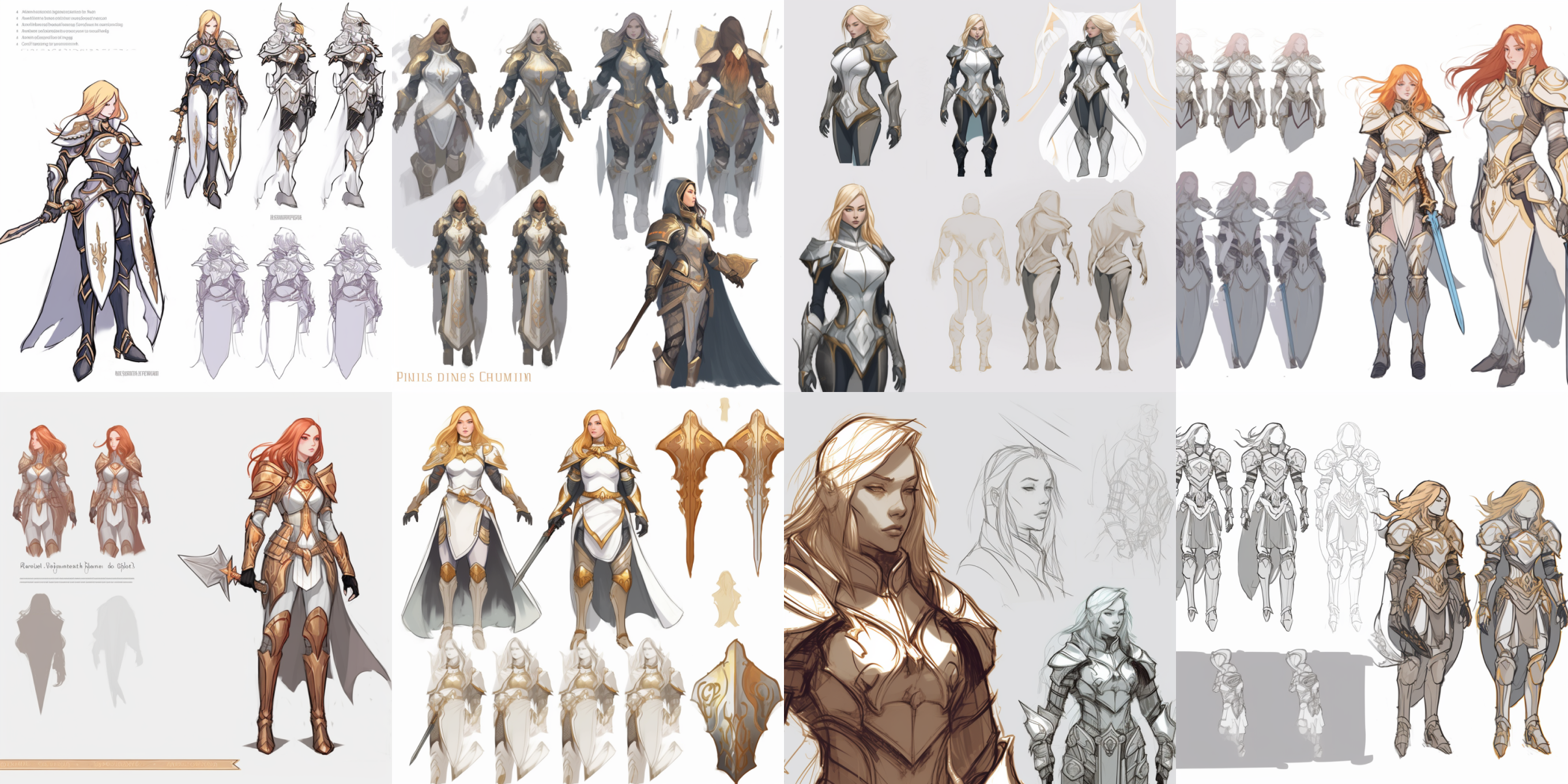Is it true that longer prompts are better?
according to Midjourney The official documentation does not necessarily say:
Prompts can be very simple. Single words (or even an emoji!) will produce an image. Very short prompts will rely heavily on Midjourney's default style, so a more descriptive prompt is better for a unique look. However, super-long prompts aren't always better. Concentrate on the main concepts you want to create.
But you will find that the prompts shared by the Chinese community seem to be very long. But as long as you observe carefully, or use translation software to check, you will find something magical:
- Some words are misspelled. The reason is that a certain book does not support copying and pasting, which leads to many people using OCR prompts and then recognizing errors. Everyone is moving prompts, causing errors to be passed on. This can be regarded as a new era watermark.
- There are some very repetitive words, such as 8k, UHD, and Ultra Quality. They all refer to the same thing, which is high definition. Adding too many of them will not have any cumulative effect.
- There are many words that you don't even know why they are needed, but everyone seems to add them. For example, words like 8K, have you ever thought about whether this word is necessary? Is it useful? But in fact, these words are not officially recommended to use, and these words may even damage your graph (see the Midjourney official FAQ chapter for details).
If you read my tutorial, you will find that in the examples I talk about, many of the pictures can be described clearly with just a few prompts, and the generated pictures are not bad either.
Of course, I am not saying that you cannot write a very long prompt. If the content you generate is already very complex, then it’s okay to make it longer. But after writing it, ask yourself, is this necessary?
Pixel Games
When it comes to games, my favorite style is pixel style, which generally includes:
- 8-bit
- 16-bit
- 32-bit
You can all try it yourself. Here’s a prompt I wrote. Recently, Zelda released its latest game, Kingdom of Tears. I really like the setting of their Sky Island, so I used Midjourney to generate a 16-bit pixel art version:
|
|
Prompt |
explain |
|
What is the type? |
16-bit pixel art |
16 bit style |
|
What is the subject? |
island in the clouds, ancient ruins |
Sky Island, there are ruins on the island |
|
What is the background? |
null |
The background (clouds) is already in the topic description, so I didn’t repeat it. |
|
What is the composition like? |
null |
Not important, let AI play freely |
|
What lens to use? |
null |
Not important, let AI play freely |
|
What style? |
Zelda style |
Because it is a Zelda remake, the Zelda style is added |
|
parameter |
null |
No parameters were added |
Generate a Pokémon scene again:
|
|
Prompt |
explain |
|
What is the type? |
8-bit pixel art |
Changed to a more retro 8-bit style |
|
What is the subject? |
types of Pokémon |
I want AI to generate content like the Pokemon map |
These two prompts are very short, but very interesting and playable. You can play with them more:
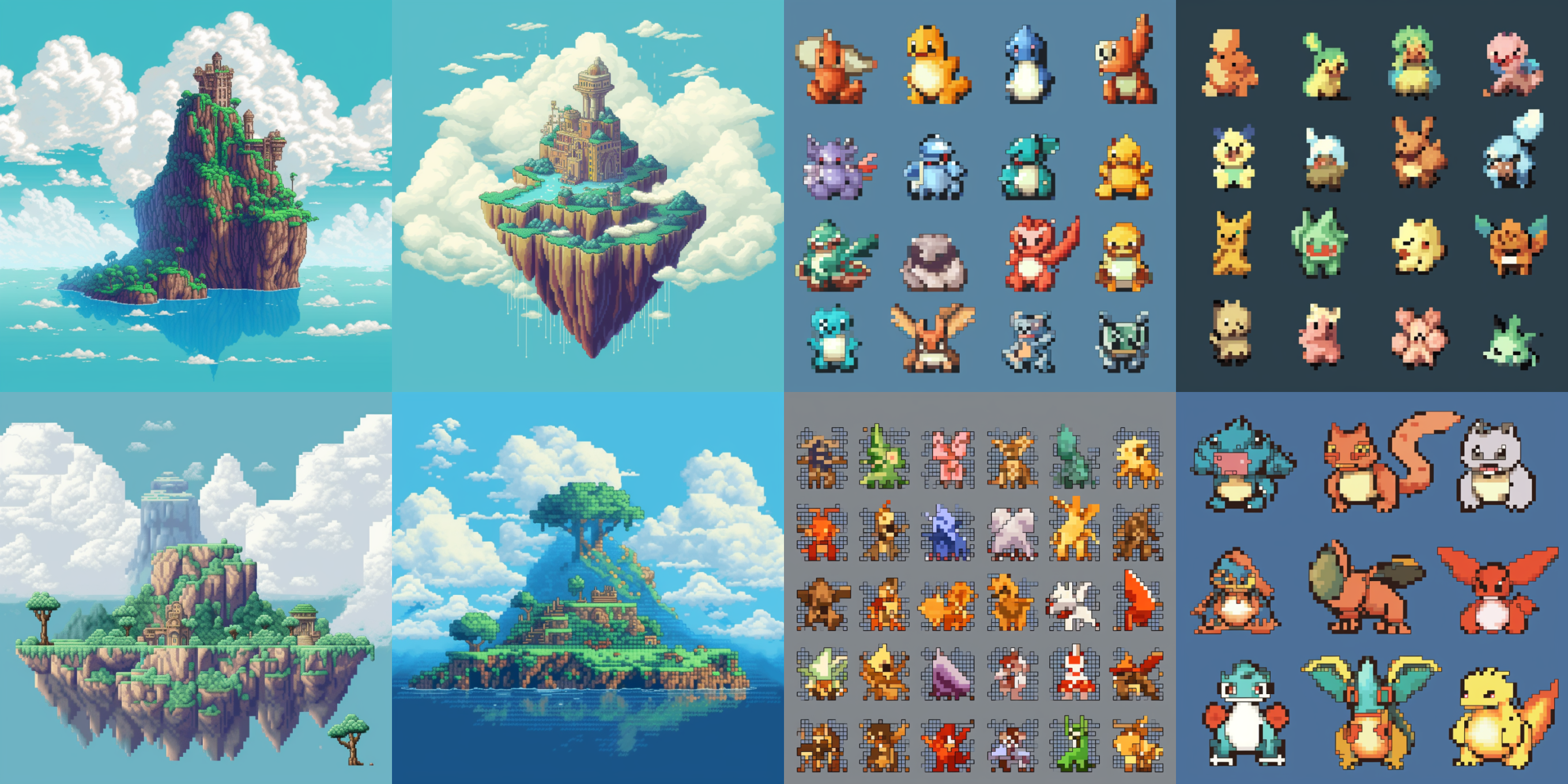
3D Game - Scene
Due to space constraints, I cannot introduce all the prompts related to 3D games. I can only talk about some of the styles that I prefer. Also, I am not a professional 3D designer, so there may be mistakes. Please forgive me.
In 3D scene design, my favorite should be the pixel-style 3D miniature scene. I don’t know if it is called this name. I will write a prompt for everyone to see:
|
|
Prompt |
explain |
|
What is the type? |
isometric clean pixel art |
I asked ChatGPT about this style, I'm not sure if it's called this. |
|
What is the subject? |
Robotics lab |
Robotics Laboratory |
|
What is the background? |
null |
Not important, let AI play freely |
|
What is the composition like? |
null |
Not important, let AI play freely |
|
What lens to use? |
null |
Not important, let AI play freely |
|
What style? |
null |
I mentioned it in the category, so no need to repeat it. |
|
parameter |
null |
No parameters were added |
The left picture below is the Mars factory, and the right picture is the robotics laboratory:
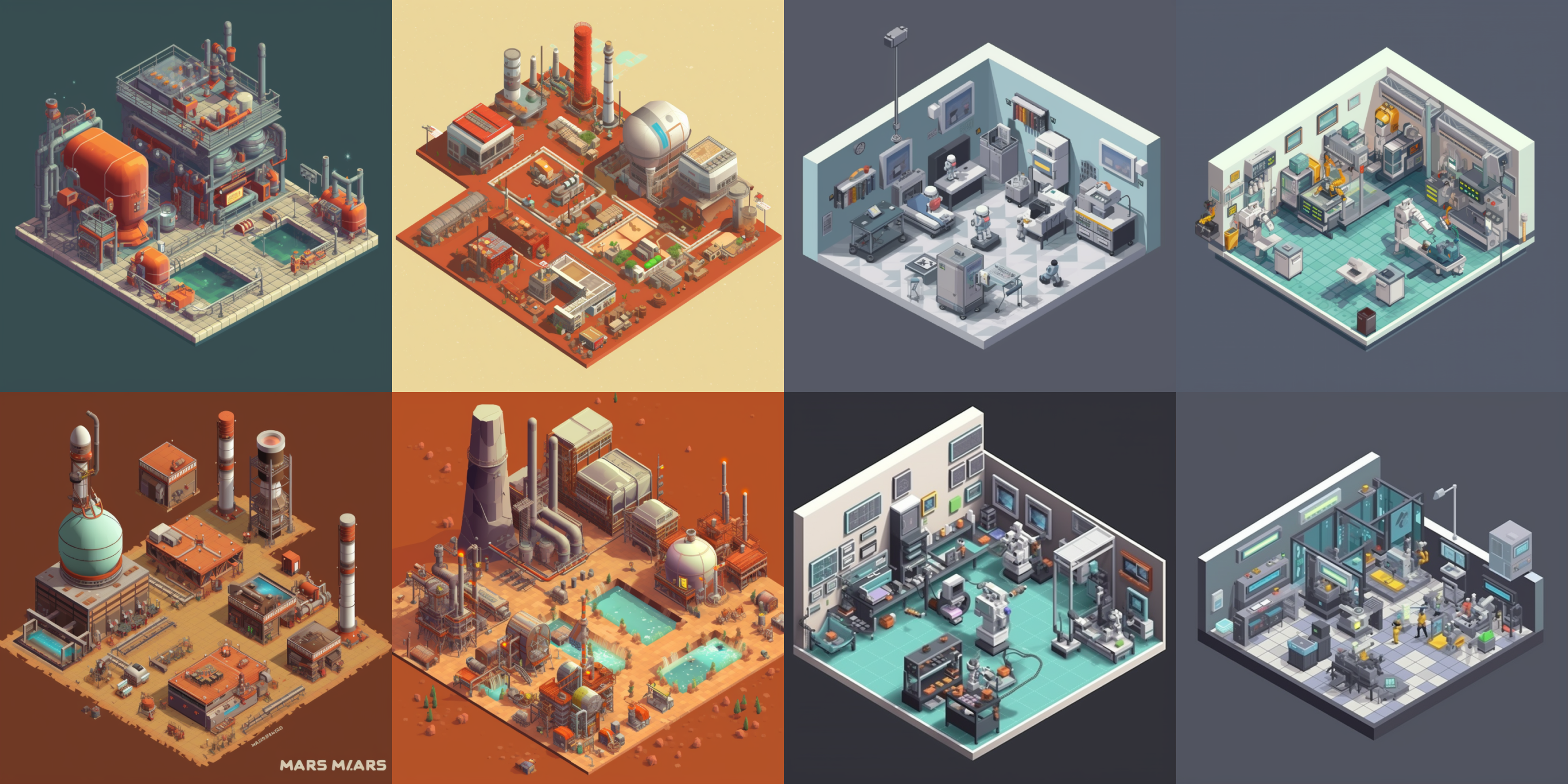
3D Games - Characters
I won’t go into the main description, but will share the necessary elements of the 3D prompt:
|
|
Prompt |
explain |
|
What is the type? |
blender 3d |
I tested it and it works just writing 3D, but for some reason it doesn't have that flavor. Adding blender (a 3D modeling software) makes it much better. |
|
What is the subject? |
Dark Vader, full body, cute |
A full-body image of Darth Vader, and then I want it to generate a Q version |
|
What is the background? |
null |
Not important, let AI play freely |
|
What is the composition like? |
isometric |
Isometric projection is a method of presenting three-dimensional objects using a two-dimensional plane. You can see the effect in the pictures generated later and you will know what it is. |
|
What lens to use? |
null |
Not important, let AI play freely |
|
What style? |
Pixar, style of artstation |
I added the Pixar style here, and similar to the chapter about illustrations that added Behance, the effect became better after adding Artstation (Artstation is similar to Behance, it is also a website for designers to share their works, but it mainly shares 3D or game-related content) |
|
parameter |
null |
No parameters were added |
I used the above prompt to generate Darth Vader and Stormtroopers. I think the Stormtroopers are pretty cute:

3D Games - Equipment
There are so many game equipments that I cannot introduce them all to you. I will only introduce some that I know about. First of all, the rings. Most of the game rings are signet rings.
|
|
Prompt |
explain |
|
What is the type? |
blender 3d |
This can be added or not |
|
What is the subject? |
star wars signet ring |
Star Wars signet ring |
|
What is the background? |
null |
Not important, let AI play freely |
|
What is the composition like? |
isometric |
Isometric projection (optional) |
|
What lens to use? |
null |
Not important, let AI play freely |
|
What style? |
null |
Not important, let AI play freely |
|
parameter |
null |
No parameters were added |
Another common one is the equipment set (I'm not sure if this is correct in Chinese, it's called Item Collections in English), which is written like this:
|
|
Prompt |
explain |
|
What is the type? |
blender 3d, game sheet |
A game sheet is a game setting diagram that lists various equipment. |
|
What is the subject? |
lightsabers, paladin armor, |
Hope to generate a series of Star Wars lightsabers and paladin armor |
|
What is the background? |
null |
Not important, let AI play freely |
|
What is the composition like? |
null |
The type is included, so you don’t need to fill it in. |
|
What lens to use? |
null |
Not important, let AI play freely |
|
What style? |
style of Hearthstone |
I really like the style of Hearthstone, and I am also curious about what kind of design will be generated when the medieval style meets the future theme. |
|
parameter |
null |
No parameters were added |
The final result is as follows, but I am not very satisfied with the generated equipment set. Later I will introduce a trick to teach you how to gradually optimize the generated image:
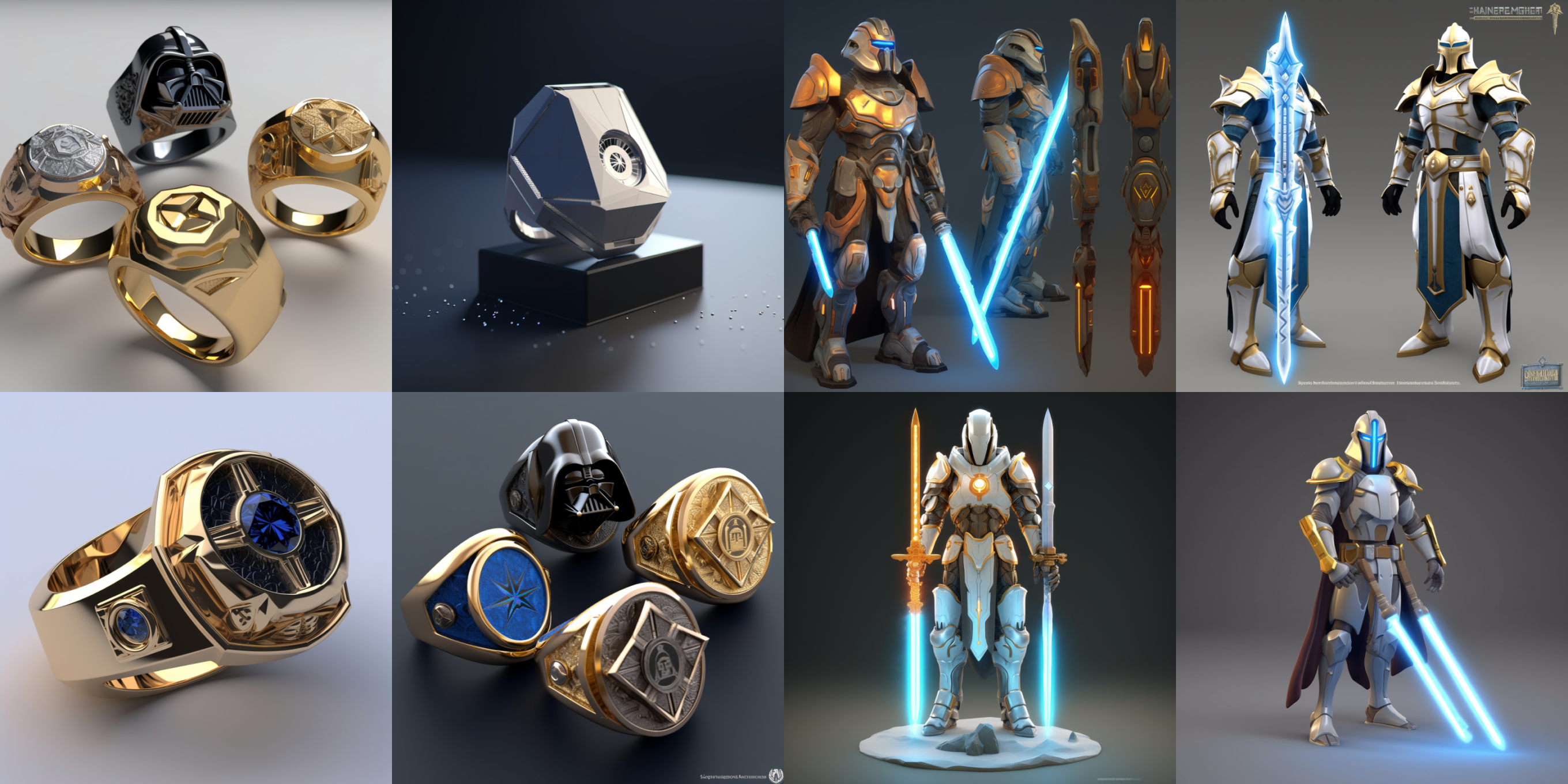
Tip 10: Progressive Optimization with Controlled Variables
Many people compare AI-generated images to alchemy, which I think is very apt. Many times, I don’t know why, but if I add a little mysterious formula to the prompt, the image will be very different.
However, I think that although the process is very similar to alchemy, it does not mean that we need to rely on luck to make elixirs like the ancients. I think the best way to use Midjourney at present is: the control variable progressive optimization method.
Take the equipment set picture above as an example. I hope it generates equipment and arranges them one by one. The lightsaber effect is also very strange. First, let's check the prompts one by one:
|
|
Prompt |
examine |
|
What is the type? |
blender 3d, game sheet |
This seems to be a bit problematic. The style of Hearthstone that I expect doesn't seem to be this kind of exquisite 3D effect. The generated style is more like StarCraft, while Hearthstone is that kind of clay render style. |
|
What is the subject? |
lightsabers, paladin armor, |
There may be a problem here, maybe there is no description of different types of lightsabers, which results in only one type of lightsaber being generated. |
|
What is the background? |
null |
This shouldn't be a problem. |
|
What is the composition like? |
null |
This shouldn't be a problem. |
|
What lens to use? |
null |
This shouldn't be a problem. |
|
What style? |
style of Hearthstone |
I feel that the generated image does not have the greasy feeling of medieval armor, but if the clay style is changed before, will it be better? This may also need to be optimized. |
|
parameter |
null |
This shouldn't be a problem. |
As you can see from this table, we found three problems. The first one is the clay style problem, which is related to the last problem. My suggestion is:
- Only one variable is modified at a time, leaving the rest unchanged.
- After modifying one item and the effect meets your expectations, modify the next one.
- In my experience, I would first modify the main content because it will sometimes affect the other variables.
- If you want to make sure that the change is consistent, or that it meets the requirements rather than just happens to meet them, you can generate it again with the same prompt. However, since each generation costs money, this is optional.
OK, according to the above principles, let's modify our prompt and see what is generated. After adding different types of, there are more lightsabers, and the problem is solved:
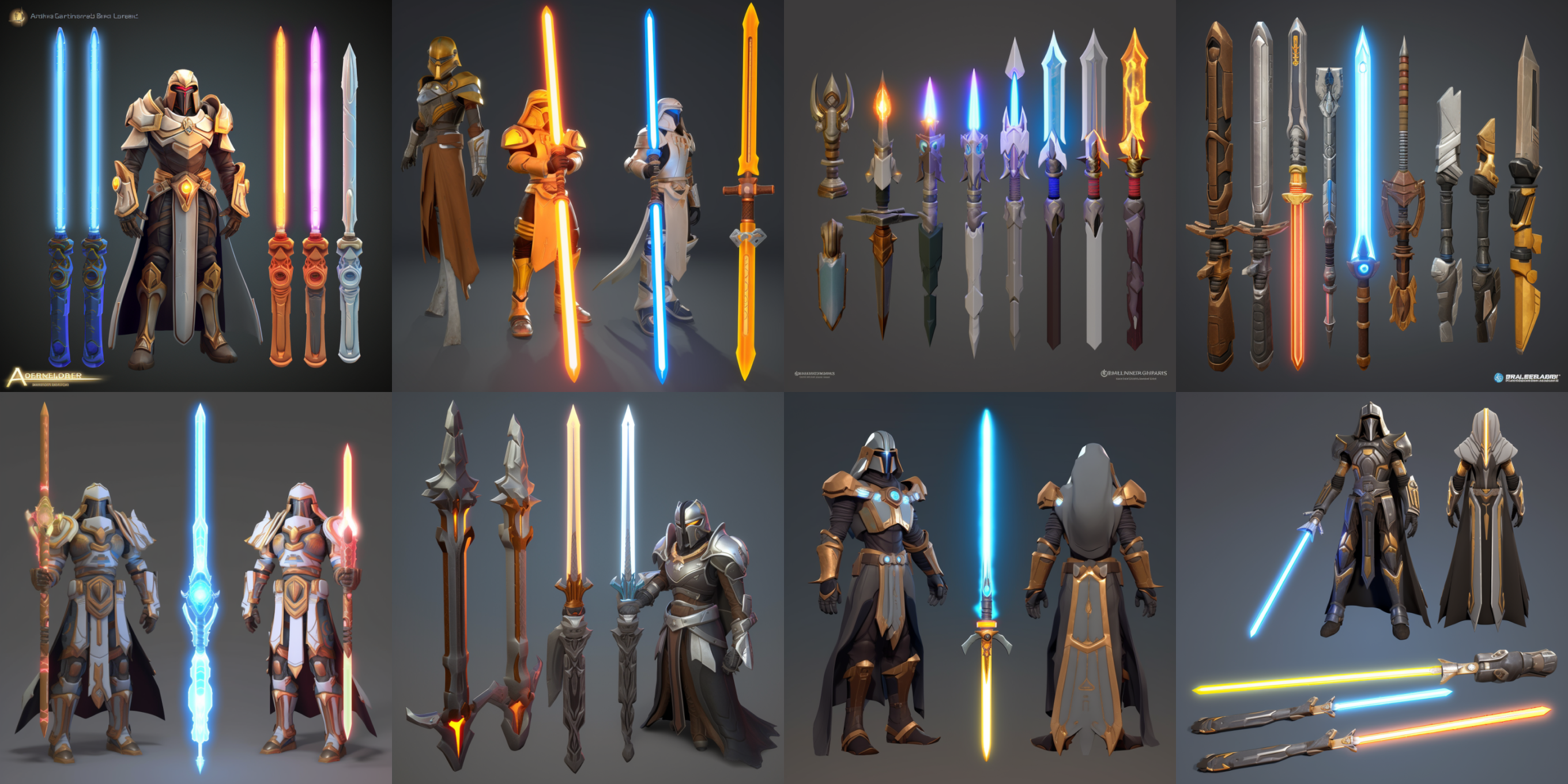
Then we modified blender 3d and changed it to clay render. After I made the change, I found that the generated results (the four pictures on the left) seemed to have a little bit worse texture, so I tried to keep the effect of 3d blender plus oily (the four pictures in the middle), and use clay render plus oily together (the four pictures on the right).
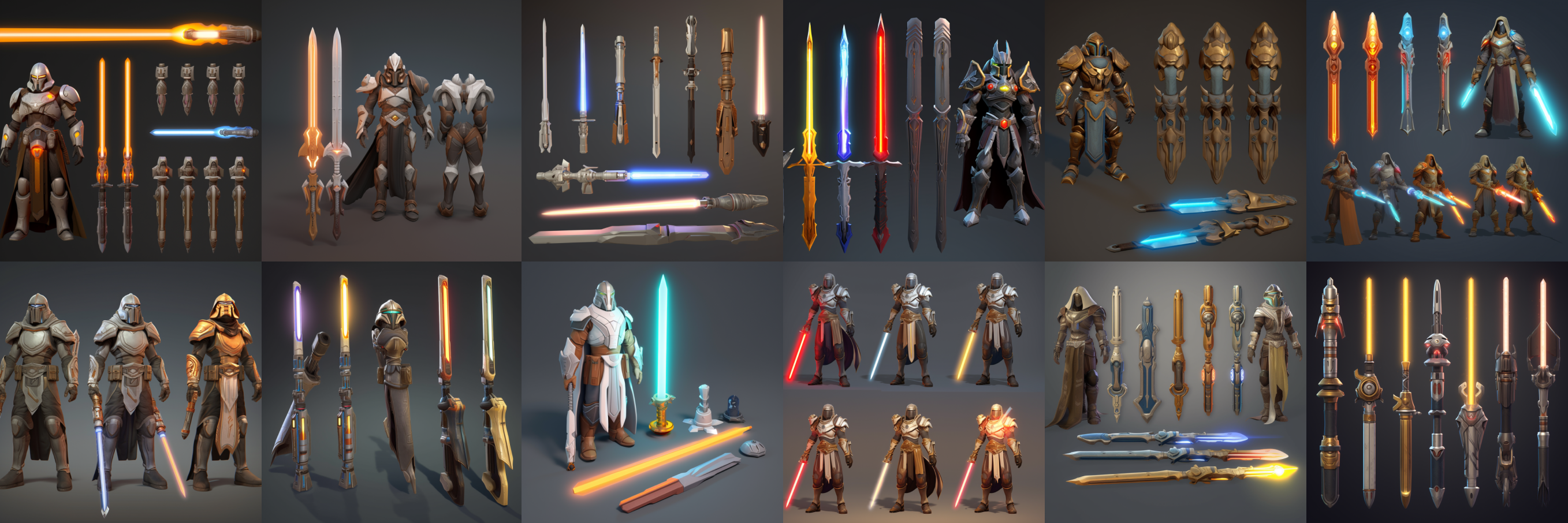
I personally think that the best effect seems to be achieved by changing both (the four pictures on the right).
Compare the pictures generated by the initial prompt to the final one. Is the final picture better? So this tip mainly wants to tell you that you don’t have to copy the answer when writing a prompt. You also have the ability to write a good prompt yourself.
Game setting draft
In this chapter of the game, I will introduce a scene character setting draft that may be used. The prompt is as follows:
|
|
Prompt |
explain |
|
What is the type? |
concept design sheet |
Setting Draft |
|
What is the subject? |
female paladin, character design, |
Generate a female Paladin character |
|
What is the background? |
white background |
The design draft is usually white. |
|
What is the composition like? |
null |
The type is included, so you don’t need to fill it in. |
|
What lens to use? |
null |
Not important, let AI play freely |
|
What style? |
null |
Since I am not familiar with the game style and designers, I let the AI play freely. |
|
parameter |
null |
No parameters were added |
The final result is as follows:
